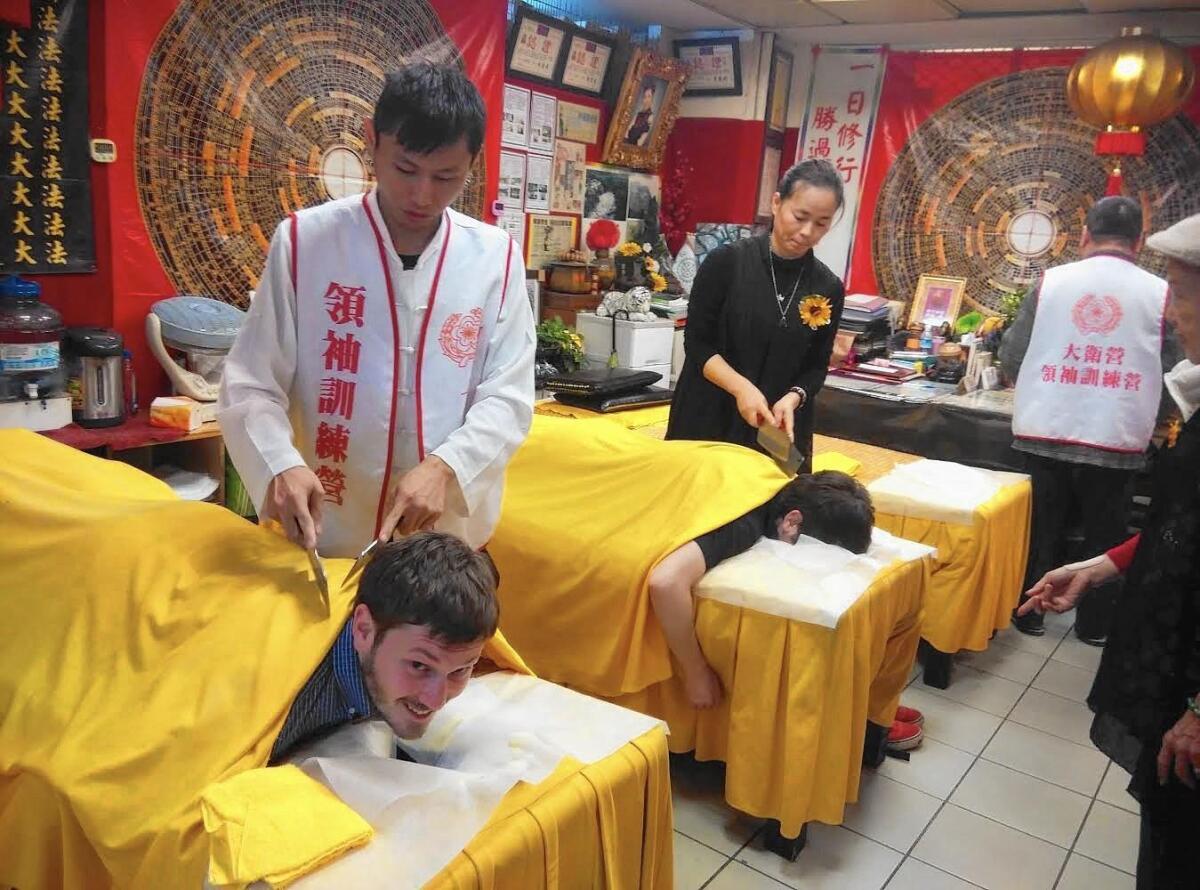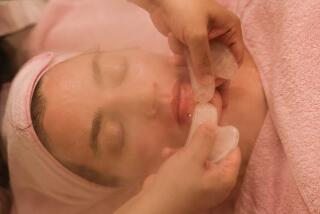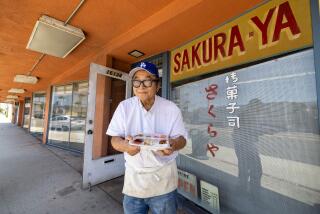Knife massage in Taiwan benefits a client with special kneads

Strolling through an underground Taipei shopping mall, bored by store after store selling humdrum bags and coats, I suddenly came upon a terrifying image: a row of bodies being rhythmically struck by men wielding glinting kitchen cleavers.
My eye flitted to the flags advertising daoliao, or knife massage, fluttering outside the storefront, then to the red-and-gold interior decorated with calligraphy. Five or six attendants, some wearing white vests over their street garb, brandished their blades like a band of supermarket butchers. I checked the menu: Getting myself tenderized for 10 minutes would cost about $7.
The customers, all fully clothed, emerged without a scratch. But I couldn’t help but admire the bravery of those who willingly submitted to a thorough if blood-free treatment. Driven by sheer curiosity, and the promise of the ultimate bar story, I signed up to go under the knife.
Turns out daoliao is not some New Age wellness fad. People in China have been undertaking knife massages since the Spring and Autumn Period (770 BC to 476 BC) in Chinese history, said Wu Wei-chuan, chairwoman of the World Daoliao Assn. in Taipei. Back then, those suffering from mysterious illnesses not easily treated by traditional medicine would ask Buddhist monks to ease their afflictions with knife therapy.
The practice gradually fell out of favor in mainland China but spread to Japan and Taiwan, then declined in popularity there too. Wu and her organization have been working for 20 years to restore the practice. She says there are more than 180 daoliao centers across Taiwan. Although some customers, like me, are interested in exhibiting a sense of bravery, many regulars come for the same reasons as in the old days. “Some people have been bothered all the time and have tried other massages to find that they didn’t help. They want to try a knife massage to see if it will do the job,” Wu said.
The steel cleavers look like those you might use to prepare dinner, but they have a blunt edge. The heavy blade can reach deeper than fingers alone, and practitioners believe the conductive steel can remove “negative energy” from the body. The result, Wu said, is less insomnia, better circulation and relief from sore muscles. Plus, you can tell your friends that you survived.
Even though the blades are dull — I made a point of ensuring mine was — and patients are covered with a sheet to further help prevent the accidental slice and dice, many first-timers express some trepidation about being chopped. Not to worry, the masseurs assured me as I stretched out on a bed, hearing the ominous clanking of metal. They’ve never had an accident.
With a knife in each hand, my young therapist pounded pressure points throughout my body with a methodical series of firm chopping motions. After easing tension from my back and legs, he flipped me over and went at my stomach.
On my back, I couldn’t see the blades, but I could feel the heavy knives move on to my extremities, gently hitting my palms and soles of my feet. The last stage of blows was completely unexpected as the masseur threw a cloth over my face and gently pounded at my head. Thankfully, it proved a soothing, if unusual, finale.
“We always tell clients it’s not about how hard you are being hit; it’s also about the transfer of energy, the transfer of chi,” said Yan Hsu-ling, who has practiced knife massage for about a decade after a career in the computer hardware industry. She is the manager of the Zhongzheng clinic, which as a member of the World Daoliao Assn. offers knife massage only.
The association says it has strict criteria before masseurs can begin training, mostly intended to ensure candidates have the right metaphysical stuff.
“We have to make sure trainees have positive energy fields first, so they can transfer energy to patients, and when facing bad energy it doesn’t affect them,” Yan said. As such, knife therapy masters are forbidden to eat meat and are expected to believe in the Buddha.
When training new masseurs — some of whom have traveled from as far as Malaysia to study — Yan first looks to see whether they are good with a blade. If their hands aren’t sufficiently balanced, she says, they need more practice.
Quick learners can pick up the basics of the trade in about a week. Recruits first practice on bedding, then on classmates before progressing to paying patients.
And the verdict on all their hard work? I walked away refreshed and limber. And apparently I’m not alone: Yan said some customers become so relaxed under the knife that they fall asleep.
The masseurs want to ensure “a more relaxing massage experience,” she said, “not just the pain of being hit by a knife.”
Silbert is a special correspondent. Tommy Yang in The Times’ Beijing bureau contributed to this report.
More to Read
Sign up for Essential California
The most important California stories and recommendations in your inbox every morning.
You may occasionally receive promotional content from the Los Angeles Times.










